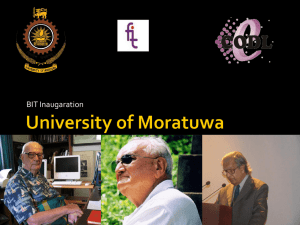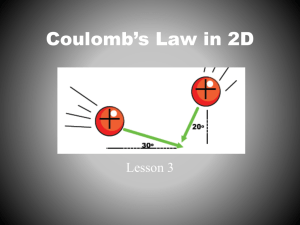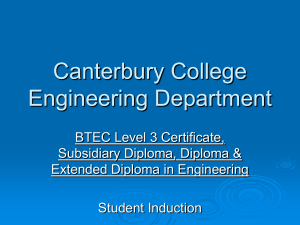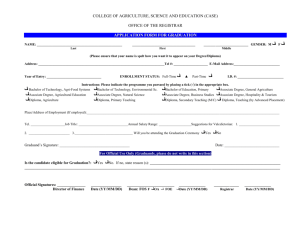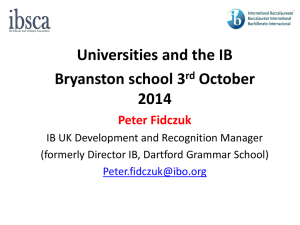IP Diploma - Faculty of Law
advertisement
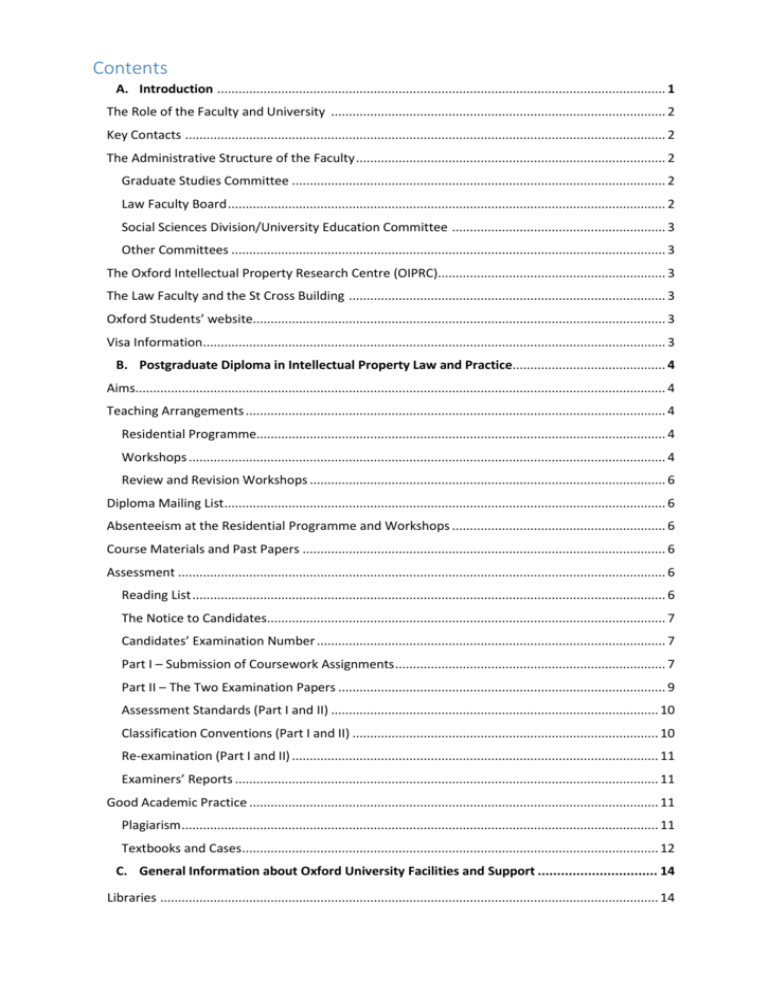
Contents A. Introduction .............................................................................................................................. 1 The Role of the Faculty and University .............................................................................................. 2 Key Contacts ....................................................................................................................................... 2 The Administrative Structure of the Faculty ....................................................................................... 2 Graduate Studies Committee ......................................................................................................... 2 Law Faculty Board ........................................................................................................................... 2 Social Sciences Division/University Education Committee ............................................................ 3 Other Committees .......................................................................................................................... 3 The Oxford Intellectual Property Research Centre (OIPRC)................................................................ 3 The Law Faculty and the St Cross Building ......................................................................................... 3 Oxford Students’ website.................................................................................................................... 3 Visa Information.................................................................................................................................. 3 B. Postgraduate Diploma in Intellectual Property Law and Practice........................................... 4 Aims..................................................................................................................................................... 4 Teaching Arrangements ...................................................................................................................... 4 Residential Programme................................................................................................................... 4 Workshops ...................................................................................................................................... 4 Review and Revision Workshops .................................................................................................... 6 Diploma Mailing List............................................................................................................................ 6 Absenteeism at the Residential Programme and Workshops ............................................................ 6 Course Materials and Past Papers ...................................................................................................... 6 Assessment ......................................................................................................................................... 6 Reading List ..................................................................................................................................... 6 The Notice to Candidates................................................................................................................ 7 Candidates’ Examination Number .................................................................................................. 7 Part I – Submission of Coursework Assignments ............................................................................ 7 Part II – The Two Examination Papers ............................................................................................ 9 Assessment Standards (Part I and II) ............................................................................................ 10 Classification Conventions (Part I and II) ...................................................................................... 10 Re-examination (Part I and II) ....................................................................................................... 11 Examiners’ Reports ....................................................................................................................... 11 Good Academic Practice ................................................................................................................... 11 Plagiarism ...................................................................................................................................... 11 Textbooks and Cases..................................................................................................................... 12 C. General Information about Oxford University Facilities and Support ............................... 14 Libraries ............................................................................................................................................ 14 Computing Services .......................................................................................................................... 14 Your Oxford Single Sign-on Account and Access to Networked Services ..................................... 14 The Faculty Website and WebLearn ............................................................................................. 14 Student Self-Service ...................................................................................................................... 14 IT Facilities in the St Cross Building ............................................................................................... 15 IT/Electronic Research Resources Training ................................................................................... 15 University Rules for Computer Use............................................................................................... 15 Support ............................................................................................................................................. 15 General Sources of Help ............................................................................................................... 15 Help for Students with Disabilities................................................................................................ 16 Education Committees and the Proctors ...................................................................................... 17 OUSU ............................................................................................................................................. 17 Careers ............................................................................................................................................. 17 Alumni .............................................................................................................................................. 17 D. University Policy Statements and Codes of Practice ............................................................. 19 Policies ............................................................................................................................................. 19 Feedback .......................................................................................................................................... 19 Complaints ....................................................................................................................................... 19 Teaching ........................................................................................................................................ 19 Quality of Library Provision........................................................................................................... 19 Academic Appeals ......................................................................................................................... 19 Further Information about Complaints ........................................................................................ 20 Skills Training .................................................................................................................................... 20 Faculty, College and Library Resources ........................................................................................ 20 University Resources..................................................................................................................... 20 A. Introduction The Oxford Postgraduate Diploma in Intellectual Property Law and Practice (the “Diploma”) is a masters-level vocational course for people embarking on a career in IP law and practice. It is a oneyear, part-time course designed to give junior practitioners a grounding in the fundamentals of IP law and practice. It is taught by senior practitioners and academics, and represents a unique collaboration between the Oxford Law Faculty and the Intellectual Property Lawyers’ Association. The people listed in the table below (see section A.2 “Key Contacts”) will be glad to provide or to find any further information that you may need. Please bear the following in mind in using this Handbook: The Handbook provides a guide to the rules for each degree programme, but in case of any conflict, the University of Oxford Examinations Regulations (published in the “Grey Book”) prevail. Amendments to the Regulations are published from time to time in the University of Oxford Gazette and updated in the online version available at: www.admin.ox.ac.uk/examregs/. You can find a great deal of further information (in particular, information about members of the Faculty and their work) on the Law Faculty website: www.law.ox.ac.uk. The Law Faculty Office communicates with Diploma students by way of messages to the Diploma Mailing List, and we expect you to be reading those messages more-or-less daily. Dev Gangjee Course Director 1 1. The Role of the Faculty and University Students taking the Diploma at Oxford are members of Oxford University generally, and of the University’s Law Faculty. At graduate level, it is the Faculty which plays the principal role in organising students’ teaching and supervision, and monitoring their academic progress. It consists of all college and University staff who are involved in the teaching of law. Its members meet regularly to discuss its affairs. There are also subject groups within the Faculty consisting of members with a particular interest in the various subjects. The Faculty is led by the Dean, who also serves as the Chair of the Faculty Board. The Faculty holds annual elections of its members to the Faculty Board, which takes an executive role on behalf of the Faculty. The Board has a number of committees. Students are also represented on it and on some of its committees, such as the Graduate Studies Committee. The Faculty Board has a Chair and a Vice-Chair, and includes a Director of Undergraduate Studies, a Director of Graduate Studies (research degrees) and a Director of Graduate Studies (taught degrees). The University constitutes the overall academic structure within which the various programmes run (it is responsible for defining syllabuses, for example, and running official examinations). It also provides sports, welfare, careers, language teaching and IT facilities. It describes its arrangements and facilities on the University website (and in particular the information under the ‘Oxford students’ link on the homepage), and, in more detail, in the literature which students receive upon or after entry, such as the Proctors’ and Assessor’s Memorandum. 2. Key Contacts For the most part, your key contacts will be your course administrator and course director. However, on occasion you may have a need to contact the Faculty, in which case principal contacts are set out below: Victoria Campbell Dev Gangjee Mindy Chen-Wishart Paul Burns Charlotte Vinnicombe Diploma Administrator Diploma Course Director Director of Graduate Studies for taught courses Academic Administrator Head of Administration and Finance victoria.campbell@law.ox.ac.uk dev.gangjee@law.ox.ac.uk mindy.chen-wishart@law.ox.ac.uk 271457 paul.burns@law.ox.ac.uk charlotte.vinnicombe@law.ox.ac.uk 271495 271560 276358 The area code for the above telephone numbers is 01865. As a general rule, you should in the first instance direct all queries to Victoria Campbell (01865 271457 or victoria.campbell@law.ox.ac.uk). She can then relay them to Diploma Course Director if the matter in question requires his involvement. 3. The Administrative Structure of the Faculty From a Graduate student perspective, the elements of the administrative structure with which it may be useful for you to be familiar are as follows: i. Graduate Studies Committee The principal body responsible for making decisions on graduate matters is the Faculty’s Graduate Studies Committee (GSC), which meets in Weeks One and Six each term. Its membership is made up of Faculty members with particular interests in graduate studies, and student representatives for graduate law courses and for the MSc in Criminology. The GSC is chaired by the two Directors of Graduate Studies (taught and research) to whom the Committee delegates certain responsibilities. ii. Law Faculty Board On certain matters, GSC has the power to act autonomously; on others, it makes recommendations to the Law Faculty Board which is the governing body of the Law Faculty. The Law Board includes the 2 Directors of Graduate Studies; most other members are elected from the Faculty, and student representatives attend its meetings. The Law Board is responsible for administering and overseeing all teaching and examining in the Faculty, and for facilitating legal research. It meets twice a term in second and seventh weeks, and in the fifth week of the Summer vacation. iii. Social Sciences Division/University Education Committee Whilst the Law Board has authority to make decisions about most student-related matters, or delegate those decisions to GSC, there are certain occasions on which it is required to seek approval from one of the Committees of the Social Sciences Division which itself may then need to refer the matter to the University Education Committee. iv. Other Committees The IP Diploma has its own management committee which meets once a term and reports to GSC, and there is a Committee for Library Provision which deals with matters relating to the functioning of the Bodleian Law Library. There are also a number of Faculty committees which deal with matters less directly associated with graduate student concerns (Planning and Resource Committee, Development Committee, Appointments Committee). 4. The Oxford Intellectual Property Research Centre (OIPRC) The OIPRC was established in 1990 at St Peter’s College by Faculty member, Peter Hayward, with an initial gift from the Hitachi Foundation. The OIPRC became a centre of the Faculty of Law in October 2008, taking its place as part of a growing number of inter-disciplinary centres at the Faculty of Law. During term time, the OIPRC runs a weekly IP seminar series on Thursdays at 5.15pm at St Peter’s College. It also hosts an annual International IP Moot competition in March. Details of these events and others run by the OIPRC are available at www.oiprc.ox.ac.uk. As a graduate student on the Diploma course, you will also be informed of these events and many more through the Diploma Mailing List (see section B.3 ‘Diploma Mailing List’ below). 5. The Law Faculty and the St Cross Building The Faculty’s physical location is the St Cross Building, on the corner of St Cross Road and Manor Road (see http://www.law.ox.ac.uk/about/location.php for further directions), which houses the Faculty’s administrative offices. To find the Faculty Office, follow the flight of steps up the outside of the building to the second landing and go through the sliding door on your right (the Faculty Office is the first office on the right). It also houses the Faculty’s principal lecture and seminar rooms – the Gulbenkian Lecture Theatre, the White & Case lecture theatre, the Cube, and Seminar Rooms C-G. At the top of the building is the Bodleian Law Library. As well as holding the library’s collection of legal texts, it also houses the Freshfields Bruckhaus Deringer IT Room and the Baker & McKenzie room – an additional seminar room. Further information about the Library is provided in section C.1 below. 6. Oxford Students’ Website For general information about all aspects of student life, academic matters, fees, social activities, health and welfare, please refer to the University’s webpage ‘Oxford Students’ at: http://www.ox.ac.uk/students. This is a very useful resource, covering information from all sorts of areas of the University’s activities and is a good starting point if you have queries on almost any subject which doesn’t pertain specifically to the Law Faculty itself. For more information about other useful University resources, please refer to section C ‘General Information about Oxford University Facilities and Support’ below. 7. Visa Information For information about all matters relating to visas, please refer in the first instance to the webpage at http://www.ox.ac.uk/students/visa. 3 B. The Postgraduate Diploma in Intellectual Property Law and Practice 1. Aims The Diploma aims to: provide students with an advanced knowledge and understanding of core aspects of intellectual property (IP) law and practice; encourage and enable students to use IP law in the mediation of competing interests; provide students with an appreciation of the role of IP rights in different commercial and other professional contexts, and encourage their development of the necessary intellectual and practical skills for analysing and harnessing that role; enable students to develop both a generalist’s understanding of IP law and practice, and a specialist’s comprehension of certain technical and procedural skills. Details of how these aims are pursued are in the Diploma programme specification available at: denning.law.ox.ac.uk/published/documents.shtml. 2. Teaching arrangements The programme is offered on a part-time basis over one academic year and has two components: a Residential Programme and a series of Workshops. i. Residential Programme The Residential Programme will be held at St Catherine’s College from 31 August 2014 to 12 September 2014. This comprises a ten-day programme (over a two week period) providing intensive teaching by academics and experienced practitioners in the following areas of IP (and related) law: ii. Patent law Trade mark law Passing-off Copyright Copyright protection for computer software and databases Designs Trade secrets Jurisdiction in intellectual property actions Conducting patent infringement actions Conducting IP litigation (other than patent litigation) International and European aspects of IP Ownership Taxation and IP Using IP as security IP aspects of corporate transactions Workshops There are six workshops held in London and hosted at law firms throughout the year focusing on aspects of IP practice and procedure. The workshops are as follows (please note that some of the venues and tutors are still to be confirmed, although we are expecting only minor changes. A final list of tutors and venue will be emailed to you in advance of each Workshop): 4 Workshops Trade Marks and Passing Off Date: 4 October 2014 Venue: Baker & McKenzie, 100 New Bridge Street, London, EC4V 6JA Tutors: Nick Aries (Bird & Bird), Peter Brownlow (Bird & Bird), Jeremy Dickerson (Burges Salmon), Paul Harris (Pillsbury), Stephen Jones (Baker & McKenzie), Katharine Stephens (Bird & Bird) Patents 1 Date: 22 November 2014 Venue: Hogan Lovells, Atlantic House, Holborn Viaduct, London, EC1A 2FG Tutors: Robert Anderson (Hogan Lovells), Brian Cordery (Bristows), Sally Field (Bristows) Patents 2 Date: 17 January 2015 Venue: Simmons & Simmons, City Point, One Ropemaker Street, London, EC27 9SS Tutors: Zoë Butler (Powell Gilbert), Brian Cordery (Bristows), Penny Gilbert (Powell Gilbert), Sally Field (Bristows), Scott Parker (Simmons & Simmons), Richard Price (Winston & Strawn) IP Aspects of Commercial Transactions Date: 28 February 2015 Venue: Simmons & Simmons, City Point, One Ropemaker Street, London, EC27 9SS Tutors: Michael Gavey (Simmons & Simmons), Angus McLean (Simmons & Simmons) Copyright Date: 14 March 2015 Venue: Dentons, One Fleet Place, London, EC4M 7WS Tutors: Jonathan Ball (Norton Rose Fulbright), Shona Harper (Dentons), John Linnekar (Dentons), Catriona Smith (Rouse) Designs Date: 25 April 2015 Venue: Dentons, One Fleet Place, London, EC4M 7WS Tutors: Sara Ashby (Redd), Simon Chalkey (Redd), Michael Hicks (Hogarth Chambers), Charters Macdonald-Brown (Redd) The Workshops are led by experienced IP practitioners and involve discussion of particular case studies and scenarios as well as various practical exercises, including written and oral presentations. There are opportunities for students to present their own ideas for discussion by groups of their peers and the workshop leaders. Refreshments and lunch will be provided. The Workshops usually start at 9.30am and finish by 5.00pm. 5 iii. Review and Revision Workshops There are 3 one-day Workshops designed for review or revision, as follows. They are expected to be held in London and hosted at law firms. Details will be confirmed nearer to the time. Patents (Review) Date: 15 November 2014 Venue: Freshfields Bruckhaus Deringer, 65 Fleet Street, London, EC4Y 1HS Tutor: Justine Pila Revision workshop 1 (Patents and Copyright) Date: 6 June 2015 Venue: To be confirmed Tutor: Justine Pila Revision workshop 2 (Trade Marks and Designs) Date: 13 June 2015 Venue To be confirmed Tutor: Graeme Dinwoodie and Dev Gangjee 3. Diploma Mailing List The Faculty’s principal means of communicating with students is via the Diploma email list, to which all students’ email addresses are automatically subscribed. Diploma email list messages have an “[DIP]” prefix in the subject line. If you are not receiving “[DIP]” emails, or to change your email address which is included in the Diploma Mailing List, please notify the Diploma Administrator. 4. Absenteeism at the Residential Programme and Workshops For accreditation purposes, attendance is taken for each day at the Residential Programme and the workshops. If you are unable to attend any session(s) of the Residential Programme or Workshop, please let the Diploma Administrator know by email why you are unable to attend. Your sponsor reserves the right to ask for a report on attendance for the Diploma. 5. Course Materials and Past Papers Course materials for the Residential Programme and Workshops will be available on the Diploma Weblearn site. Once course materials have been uploaded onto Weblearn, an email informing you of this will be sent through the Diploma Mailing List. An archive of past examination papers is also available on this site. 6. Assessment Assessment is divided into two parts; Part I consists of five coursework assignments based on five of the Workshops (as set out in section B.6.iv “Part I - Submission of Coursework Assignments” below) and assessed throughout the academic year, and Part II consists of two two-hour unseen written examination papers in June/July 2015 based on elements of the course covered in the residential programme and the cases listed under Essential Reading on the reading list. i. Reading List The core reading list for the Diploma will be provided before the Residential Programme and updated once, towards the end of the course. This core list has two components: (a) for examination purposes, students should familiarise themselves with the cases and materials listed under “Essential Reading”. (b) For those who would like to know more about specific areas in greater detail, additional material 6 is provided under “Further Reading”. An updated core list will be circulated after the cut-off date of 28 May 2015 (i.e. the Designs coursework submission date). Candidates are not required to have detailed knowledge of developments and cases after the cut-off date. Apart from the core list, course tutors may provide their own lists to students (e.g., listing materials to be read prior to a lecture or workshop). However students will not be examined on the additional materials contained in such lists. ii. The Notice to Candidates The examination process is the responsibility of a Board of Examiners, members of which are nominated by the Law Board and appointed by the University. The Board of Examiners issues a Notice to Candidates (known as the “Examiners’ Edict”) in early October 2014, giving full details of examination procedures and requirements plus the timetable. The Examiners’ Edict is sent to each candidate by email attachment and also by hard copy. It is important that students read this carefully and keep it for future reference; there are procedures to be observed and deadlines to be met. Candidates for examinations may not directly contact the Board of Examiners or the University Proctors, who have certain powers in connection with the conduct of examinations (such as granting permission for late submission of written work, and approving special arrangements for candidates with disabilities). Any queries or difficulties concerning examination matters should be referred at once to the Diploma Administrator. Should it be necessary to apply to the Proctors, the Diploma Administrator will do so on your behalf. What follows is preliminary information and an outline of the instructions and information which will be dealt with in the Edict. iii. Candidate’s Examination Number In all examinations, candidates are identified only by their examination number, which will be notified to you by the Diploma Administrator. Only your examination number (not your name) should be quoted on written work or examination scripts submitted to the examiners. iv. Part I - Submission of Coursework Assignments The coursework assignments are distributed to students during the five weekend Workshops below. The assignments relate to each of the Workshops and generally take the form of a practical exercise, such as the drafting of statements of case or instructions to counsel. The submission deadlines for the assignments are listed in the table below: Coursework Assignment Distribution Date Submission Deadline Trade Marks and Passing off 4 October 2014 1pm, 31 October 2014 Patents 1 22 November 2014 1pm, 19 December 2014 Patents 2 17 January 2015 1pm, 13 February 2015 Copyright 14 March 2015 1pm, 15 April 2015 Designs 25 April 2015 1pm, 28 May 2015 If you are unable to attend a Workshop, please inform the Diploma Administrator at least one week beforehand. It is each individual student’s responsibility to ensure that they obtain a copy of each assignment and meet the submission deadline. Extensions are not granted due to a student’s absence from the Workshop at which the assignment was distributed. 7 If you have any queries about the content of the coursework assignment, you must submit your queries within two weeks after the coursework assignment has been handed out. Queries received after the two week period will not be entertained. In preparing assignments for submission, students should note the following rules which will be strictly enforced. The word-limit for each assignment is 3000 words unless otherwise stated in the coursework assignment question paper, inclusive of footnotes. There is an allowance of an extra 3% above the 3000 words. The assignment must be typed and the pages numbered. Each assignment should have a cover sheet attached to it containing the title of the assignment (e.g. Patents 1), your examination number and the number of words used. Assignments should be stapled, not held together by a paper clip. You should take seriously the word limit imposed. If a candidate exceeds the word limit the Examiners may decide not to proceed with the examination of the work. If they do proceed, they may reduce the mark. The University has strict rules for the submission and examination of coursework assignments. Two type-written copies of each assignment must be delivered in an envelope to the Clerk of Schools, Examination Schools, 75-81 High Street, Oxford OX1 4BG. The envelope should be addressed to The Chair of Examiners for the Diploma in Intellectual Property Law and Practice, and your examination number should be written in the top right-hand corner of the envelope. With each assignment you must include a statement, signed by yourself, that, except where otherwise stated, the assignment is entirely your own work, and that no help was received, even bibliographical, with its preparation. To assist you, a template Declaration of Authorship is included with each question paper. Delivery may be by hand, by courier service, or by registered post, but, if not made by hand, the envelope containing your written work (addressed as instructed above) must be placed inside a delivery envelope which should be addressed to The Chair of the Diploma in Intellectual Property Law and Practice, c/o The Clerk of the Schools, Examination Schools, 75-81 High Street, Oxford OX1 4BG. However delivery is made, the package must arrive by the deadline (as set out in section B.7.iv “Part I - Submission of Coursework Assignments” above). You are strongly advised to obtain proof of collection by a courier service or proof of posting. It is your responsibility for ensuring that your submission arrives in time by the deadline stipulated. At the same time as you submit hard copies of each assignment to the Examination Schools, you must also submit electronically a copy of that assignment to the Diploma Administrator. A random sample of assignments will be checked for plagiarism using the Turnitin software. There are strict rules governing late submission. Hard copies of your coursework assignments have to be received by the Examination Schools by the deadline. An assignment submitted late (even a few minutes past the deadline, or even if the electronic copy has been submitted by the deadline) is not released to the examiners but is held in the Examination Schools and the Proctors informed. If there is a risk that you will not be able to meet the deadline for submission, you should as early as possible consult the Diploma Administrator, who will on your behalf contact the Proctors explaining the reason for late submission and requesting an extension of the deadline for you. There must be ‘reasonable grounds’ for the grant of an extension (e.g. ill-health). The Proctors may permit you to remain in the examination and to submit the written work late, but will impose a late presentation fee (to cover administrative costs). In addition, the Proctors may give leave to the Examiners to impose an academic penalty. Further information concerning late presentation fees and academic penalties is given in the Examiners’ Edict (see section B.6.ii ‘The Notice to Candidates’ above). 8 If you consider that your performance in the coursework assignments will be, or has been, affected by acute illness or some other urgent cause of which the Examiners have no knowledge, you may, through the Diploma Administrator, inform the Proctors of these factors. Usually this will involve submitting a medical certificate. The Proctors will pass the information to the Chair of Examiners if, in their opinion, it is likely to assist the Examiners in the performance of their duties. If you fail to submit a coursework assignment without having obtained the prior permission of the Proctors, you are deemed to have failed the entire Diploma examination (not just that particular part of the examination) unless the Proctors give instructions to the Examiners about reinstating you. You should consult the Diploma Administrator if any of these situations apply to you. (See further: Examination Regulations, Part 11: http://www.admin.ox.ac.uk/examregs/0811_Part_11_Acute_illness_or_other_urgent_causes_affecting.shtml). Be sure to back-up your work. The Proctors do not look sympathetically on requests for late submission of assignments in cases where computer data have been lost or stolen and back-up copies either were not made or were not kept separately. Similarly, the Proctors are unlikely to accept computer or printer break-down or viruses and other software problems as a legitimate reason for requesting extra time. The standards applied in the assessment of Diploma assignment answers will be the same as the standards applied in the assessment of Diploma written examinations, detailed below. v. Part II - The Two Examination Papers The written examination papers to be taken on Monday 29th June 2015 will assess the substantive law elements of the course covered in the residential programme and reading-list. Candidates will be required to answer two questions (an essay question and a problem question) on each of the two twohour papers. The two papers are Intellectual Property I and Intellectual Property II. The examination will be unseen. Candidates are permitted under certain conditions to bring into the examination room their own copies of the Butterworths Intellectual Property Law Handbook, 11th edition. The Handbook that you bring into the examinations must comply with strict conditions. A notice of these conditions will be sent to you in due course, but, in the meantime, please note that the copy you bring into the examination room must be absolutely clean and unmarked (including highlighting). Scripts are hand written, so it is very important that your handwriting is legible; if the Examiners are unable to read your script, you will be required to have it typed out at your own expense. The Proctors may authorize special arrangements (e.g. extra time, use of a word processor) for candidates who for medical or other reasons have special needs. If this applies to you, please contact the Diploma Administrator as early as possible but no later than the end of January 2015. See further: Examination Regulations 2014, Part 10. http://www.admin.ox.ac.uk/examregs/0810_Part_10_Candidates_with_Special_Examination_Needs.shtml. If you consider that your performance in an examination will be, or has been, affected by acute illness or some other urgent cause of which the Examiners have no knowledge, you may, through the Diploma Administrator, inform the Proctors of these factors. Usually this will involve submitting a medical certificate. The Proctors will pass the information to the Chair of Examiners if, in their opinion, it is likely to assist the Examiners in the performance of their duties. If you fail to attend a written examination paper without having obtained the prior permission of the Proctors, you are deemed to have failed the entire Diploma examination (not just that particular part of the examination) unless the Proctors give instructions to the Examiners about reinstating you. You should consult the Diploma Administrator if any of these situations apply to you. (See further: Examination Regulations, Part 11: http://www.admin.ox.ac.uk/examregs/089 11_Part_11_Acute_illness_or_other_urgent_causes_affecting.shtml). vi. Assessment Standards (Part I and Part II) The University requires examination scripts and other written work to be marked on a scale from 1 to 100. Marks of 70 or above are Distinction marks, and marks of 50-69 are Pass marks. Marks of 49 or below are Fail marks. The standards applied to the assessment of the coursework assignments (Part I) and written examination paper scripts (Part II) are given below: Distinction (70% and above): Distinction answers are those that represent an excellent level of attainment for a student at Postgraduate level. They exhibit the following qualities: acute attention to the question asked; a deep and detailed knowledge and understanding of the topic addressed and its place in the surrounding context; excellent synthesis and analysis of materials, with no or almost no substantial errors or omissions, and coverage of at least some less obvious angles; excellent clarity and appropriateness of structure, argument, integration of information and ideas, and expression; identification of more than one possible line of argument; advanced appreciation of practical arguments concerning the topic, substantial critical facility, and personal contribution to debate on the topic. Pass (50-69%): Pass answers represent a level of attainment which, for a student at Postgraduate level, is within the range acceptable to very good. They exhibit the following qualities: attention to the question asked; a clear and fairly detailed knowledge and understanding of the topic addressed and its place in the surrounding context; good synthesis and analysis of materials, with few substantial errors or omissions; a clear and appropriate structure, argument, integration of information and ideas, and expression; identification of more than one possible line of argument; familiarity with practical arguments concerning the topic, and (especially in the case of high pass answers) a significant degree of critical facility. Fail (below 50%): Qualities required for a pass answer are absent. vii. Classification Conventions (Part I and Part II) Marks are awarded for each coursework assignment (Part I) and for each written examination paper (Part II), giving an overall profile of seven marks. Classification is determined by the application of conventions. It is important to appreciate that these conventions are not inflexible rules. The Examiners have a residual discretion to deal with unusual cases and circumstances. Subject to that caveat, the conventions that will normally be applied are as follows: (a) For the award of the Diploma there must be no mark below 50 in any of the course work assignments (Part I) or examination papers (Part II). A mark below 50 may not be compensated by very good performance elsewhere. (b) For the award of a Distinction in the Diploma a candidate must achieve in the same examination year marks of 70 or above in three or more papers, including in at least one of 10 the examination papers (Part II), and must have no mark below 55 in any paper. For this calculation, the assignments count as five papers and the examination papers count as two papers (making a total of seven papers in all). viii. Re-examination (Part I and Part II) Candidates who fail or withdraw from the whole or part of the Diploma examination may offer themselves for re-examination in the immediately following academic year only. However, the Education Committee and Proctors may permit later partial re-takes in exceptional circumstances. Candidates who fail any of the seven papers (five coursework assignments and two examination papers), or who withdraw before submission of all seven papers, may re-take in the following academic year, any paper in which they achieved a mark of 49 or below, and may carry forward the marks of any paper they passed (marks of 50 or above). ix. Examiners’ Reports Examiners’ reports from previous years can be found on the Faculty’s website at http://www.law.ox.ac.uk/publications/handbooks.php 7. Good Academic Practice i. Plagiarism You are reminded that the work that you present for your examination (this includes assignments, projects, dissertations and examination papers) must be your own work and not the work of another individual. You should not quote or closely paraphrase passages from another source, be that a book, article, web page, another student’s work or other source, without acknowledging and referencing that source. If you do present other people’s work as your own work you are committing plagiarism. This is cheating and the Faculty and the University treat any alleged offence of plagiarism very seriously. The University’s definition of plagiarism can be found at: http://www.ox.ac.uk/admissions/postgraduate_courses/apply/legal_information/plagiarism.html. The University’s Education Committee has developed a website (http://www.ox.ac.uk/students/academic/goodpractice/) that gives useful advice about all aspects of plagiarism – why it matters, how to avoid it, what happens if you are suspected of plagiarism etc. It also provides a list of related documents which includes advice from other institutions, and about academic good practice more generally. For law students, there are particular things to watch for: Getting ideas from other students work Law students often "borrow" work from other students in their own year or from students in the year above. If the work is directly copied them this will clearly be an obvious form of plagiarism but you also need to be aware that taking the structure and ideas from this work can also be plagiarism unless the source is acknowledged. Although it may sometimes be helpful to see how others have tackled issues, an important part of the learning exercise in Oxford is to work out how to present an answer yourself. This is often an intellectual struggle but it is an important part of the educational process. By borrowing the work of others you therefore not only risk plagiarism but you are also less likely to develop your own intellectual abilities fully. Articles etc. You will be expected to read many articles as part of your tutorial preparation. Students often find it difficult to know how to incorporate these into their own written work. The temptation is there to "lift" bits from the introduction and conclusion of the article, or odd sentences from it. Usually, an 11 article will be presenting an argument which is, to some extent, original and the author makes the case for this argument in the detailed text. You may wish to use this article in a variety of different ways but it is important to bear in mind that it is not only verbatim quotations and paraphrases that need to be properly referenced but also the overarching argument that the author makes. Therefore, even if you are not using any of the detailed wording of the article, you must still acknowledge the author's intellectual input if you are drawing on the argument that (s)he makes. A brief example: Source text, from S Bright and B McFarlane, Proprietary Estoppel and Property Rights (2005) 64 Cambridge Law Journal, 449, 455. It can therefore be argued that proprietary estoppel, like wrongs, unjust enrichment and other nonconsensual sources of rights, always gives rise to an underlying personal liability which may, in some circumstances, be coupled with a property right. As A's personal liability will persist after a transfer of the land in respect of which the proprietary estoppel claim arose, it may well be that B has no need of a property right to protect his reliance: instead B is adequately protected through his personal right against A. Plagiarised Proprietary estoppel always gives rise to personal liability and may also generate a property right, but a person to whom a representation is made will not always need a property right to adequately protect his reliance. (This is plagiarism. Even though there is little verbatim copying it paraphrases the argument of Bright and McFarlane without acknowledging the source of this argument.) “Proprietary estoppel, like wrongs, unjust enrichment and other non-consensual sources of rights, always gives rise to an underlying personal liability”1 and sometimes the courts will give a property right if necessary to protect reliance. (This is also plagiarism. Although the first part of the sentence is correctly attributed, the implication is that the second part is the original idea of the writer.) Non-Plagiarised Bright and McFarlane argue both that proprietary estoppel gives rise to personal liability and, further, that this will sometimes be coupled with a property right, but only if it is necessary to protect the reliance of the person to whom the representation was made.2 (This is not plagiarism as it clearly attributes the whole of the argument to Bright and McFarlane, and cites the source). ii. Textbooks and Cases A particular challenge for law students is how to use text books correctly. The most obvious form of plagiarism is where students closely follow the wording of textbook writers. This often occurs (unintentionally) where students have taken notes from a textbook and then use these notes to form the basis of their essay. 1 2 S Bright and B McFarlane, Proprietary Estoppel and Property Rights (2005) 64 Cambridge Law Journal, 449, 455 S Bright and B McFarlane, Proprietary Estoppel and Property Rights (2005) 64 Cambridge Law Journal, 449, 455 12 It also occurs where students use the structure adopted by a text book writer in order to organise the essay. By way of illustration, the author of a text book may set out that a general principle can be manifested in one of 3 ways, and then set out those 3 ways. To the student, this may appear uncontroversial and as ‘the only’ way that the topic can be understand. It is likely, however, that other writers will present the material differently. The breakdown of the principle into those 3 ways is the author’s work, and if this structure is adopted, the author must be acknowledged. Students often use text-books too closely without being aware that this constitutes plagiarism and will say to tutors: “…but X put it so clearly and I could not put it better”, or “…lots of writers break down this principle into those 3 ways”. This does not justify plagiarism. If a text book writer is being relied on, the writer must be acknowledged. The same applies with respect to cases. The reasons for citing a case are therefore two-fold: first, as an authority for a proposition of law, in which case you will generally be citing the case itself; and second, as the source of a statement about the law, in which case you will generally be citing the court or a judge. If, having referred to the above and to the University website, you are still unsure how to reference your work properly, and would like further advice, you should contact your Tutor or Director of Studies for guidance. 13 C. General Information about Oxford University Facilities and Support 1. Libraries The Law Faculty is lucky to have a superb library resource in the form of the Bodleian Law Library, which has an excellent, extensive collection, providing support for the teaching and research needs of our students. It is a library of legal deposit, with the largest law collection in the United Kingdom. It offers not only its collection of books, but access to all relevant legal electronic databases and online journals. All books on the reading lists are placed at the library's reserve desk, for ease of access. As a member of the University you are also able to use any of the other 40 libraries which are part of the Oxford University Library Service. Books in the law library may not be borrowed: they must be read in the library, this ensures they are always available when you need them, and there are self-service photocopying facilities. Public access computers are available in several areas of the Library, including the Freshfields Bruckhaus Deringer IT Room. They provide access to the catalogue and the extensive range of databases provided by Oxford University Library Services. PCs in the Freshfields Bruckhaus Deringer IT Room also give access to word processing and other computing applications. Students’ own laptops may be used in the Library, which has wireless and ethernet access. The Baker & McKenzie Seminar Room is available for small group discussions when not in use for seminars. 2. Computing Services i. Your Oxford single-sign on account and access to networked services Your Oxford single-sign on account is your main access to University online services. It is essential that you activate your account. It gives you access to all the main Oxford University services, including Student Self-Service, electronic library services, such as Lexis, Westlaw and online journals; Oxford email (https://nexus.ox.ac.uk/); and WebLearn (https://weblearn.ox.ac.uk/portal/hierarchy/socsci/law), where reading lists and course materials are available. For more information about IT Services see http://welcometoit.ox.ac.uk. IT Services is at 13 Banbury Road, phone 273200, fax 273275 or e-mail help@oucs.ox.ac.uk. ii. The Faculty website and WebLearn The public Faculty website (www.law.ox.ac.uk) provides information about courses, news and events, graduate discussion groups, how the Faculty works, Faculty members, much detail relevant to undergraduate and postgraduate study, links to Faculty centres, specialisations, publications, library and computing facilities and more. The Faculty website has two sections, the public site, and the intranet site. Reading lists and course materials are held on WebLearn (https://weblearn.ox.ac.uk/portal/hierarchy/socsci/law). All students have their own password-protected ‘My WebLearn’ site on WebLearn which provides calendars and some file storage. For help with WebLearn, please contact the Diploma Administrator. iii. Student Self-Service Student Self-Service provides web access to important information that you will need throughout your academic career. You are able to register, view and update your personal and academic information 14 throughout your studies at Oxford. http://www.ox.ac.uk/students/studentselfservice/ For further information, see iv. IT facilities in the St. Cross Building Most of the computing provision for students in the St. Cross Building is within the Bodleian Law Library (BLL). The Freshfields Bruckhaus Deringer IT Training Room has 26 networked computers, giving access to all the online resources within the Library and University. Word and other Microsoft Office applications and EndNote are available on these computers. It is necessary to use a USB key to save documents on these computers. The Freshfields Bruckhaus Deringer IT room is available for general use when not being used for teaching. There are also networked computers in the upstairs gallery computer room, and more at various positions around the library. Kurzweil software, which allows blind readers to listen to pages of a book being read aloud, is also available in the BLL, but it must be booked in advance. The main reading room has wireless access and there are power points at the ends of several desks. For more information ask at the library. Do not leave your laptop unattended in the library or anywhere else – cables for securing your laptop are available at the library enquiry desk or at any computing shop. v. IT/electronic research resources training The library’s electronic holdings are accessible via SOLO: http://solo.bodleian.ox.ac.uk and OxLIP+: http://oxlip-plus.bodleian.ox.ac.uk. When off-campus, your Oxford Account log in is required to access electronic holdings. With the exception of Lexis Library and Westlaw, most databases do not require passwords when on campus. Detailed information about legal databases and passwords is available at www.bodleian.ox.ac.uk/law/e-resources/databases. Online tutorials for key legal and journal databases are available at http://ox.libguides.com/law-uklaw. The BLL also gives classes on using databases, finding online journals and researching particular areas of law. The Library distributes a Newsletter via the Faculty’s email lists, and the Law Bod Blog (http://lawod.wordpress.com) also provides current information. vi. University Rules for Computer Use The University’s Regulations and Policies applying to use of University ICT facilities can be found at http://www.it.ox.ac.uk/legal/rules/ In the Policy Statements section below, there is also a specific link to the Regulations Relating to the use of Information Technology Facilities – though that information can also be found at the URL above. 3. Support i. General sources of help Being a student is exciting, challenging and rewarding, but it is not always a bed of roses! Everyone in Oxford is well aware that students, like anyone else, can have problems. To a large extent we take these in our stride, consciously or unconsciously making use of the familiar support systems with which we surround ourselves, such as family bonds, friendships, and reliance upon those whose role it is to supervise us. But sometimes our problems need more intensive attention. Do not feel alarmed about acknowledging this: it really can happen to anyone. Oxford has a number of mechanisms designed to help. The first person you should speak to is the Diploma Administrator or Course Director. 15 The University offers a counselling Service to help you address personal or emotional problems that get in the way of having a good experience at Oxford and realising your full academic and personal potential. They offer a free and confidential service. For more information visit: www.ox.ac.uk/students/shw/counselling/ There is also range of services led by students are available to help provide support to other students, peer support, OUSU Student Advice Service and Nightline. For more information visit: www.ox.ac.uk/students/shw/peer/ The Equality and Diversity Unit supports a network of over 300 harassment advisors in departments/faculties and colleges and a central Harassment Advisory Service. For more information on the University’s Harassment and Bullying policy and the support available for students visit: www.admin.ox.ac.uk/eop/harassmentadvice/ The Faculty has two harassment advisors whom students and Faculty may contact for advice: Sue Bright, New College Tel No: 01865 289050 Email: Sue.Bright@law.ox.ac.uk Roderick Bagshaw, Magdalen College Tel No: 276078 Email: Roderick.Bagshaw@law.ox.ac.uk For information on a variety of issues relating to health and welfare, you can also consult the University webpage at http://www.ox.ac.uk/students/welfare. This covers subjects such as general health, disability, counselling and student-led support. ii. Help for students with disabilities The Disability Advisory Service (DAS) can provide information, advice and guidance on the way in which a particular disability may impact on your student experience at the University and assist with organising disability-related study support. For more information visit: www.ox.ac.uk/students/shw/das/ The Law Faculty itself has two Disability Contacts. These are: Emma Gascoigne, Personnel Officer St. Cross Building Tel No: 01865 281622 e-mail: Emma.Gascoigne@law.ox.ac.uk Paul Burns, Academic Administrator St. Cross Building,St. Cross Road Tel No: 01865 271495 e-mail: Paul.Burns@law.ox.ac.uk The Disability Contacts work with the University Disability Staff and other bodies, such as the Bodleian Law Library to help facilitate students’ access to lectures, classes, tutorials and access to information. The Contacts are also involved in an ongoing programme to identify and promote good practice in relation to access to teaching and learning for students with disabilities within the Faculty, and to ensure that the Faculty meets the requirements of the Equality Act (2010). 16 iii. Education Committee and the Proctors The University’s Education Committee is principally concerned with policy matters relating to teaching, learning, and assessment, but it is also the body which can grant dispensations from the regulations in certain instances (though in such situations a student’s college or course administrator will normally write to the Education Committee on the student’s behalf – the student does not write direct). Further information about the Education Committee and its activities can be found at http://www.admin.ox.ac.uk/edc/ The Proctors are responsible for ensuring that regulations are implemented and investigating complaints by members of the University. The activities they regulate and the regulations they enforce are set out in detail in the documents on the Webpage ‘Essential information for students’ at http://www.admin.ox.ac.uk/proctors/info/ The Proctors’ and Assessor’s Memorandum in particular covers an extensive range of subjects, including disciplinary procedures, welfare matters, and a number of University policies which are referred to in the policy statements section below. iv. OUSU The Oxford University Student Union exists to provide a number of student services, ranging from enhancement of your experience whilst a student to protection of your ability to study should you encounter financial, academic or health-related difficulties. For further information about all its activities, please refer to its website at http://ousu.org/ 4. Careers The Careers Service can provide you with comprehensive support in your career planning and management. As an Oxford Alumnus you can attend careers events, fairs, workshops and company presentations. Your student account on CareerConnect will switch to an alumni account when your University card expires, ensuring you stay up-to-date with job vacancies, events, skills sessions, fairs and resources on job sectors, applications and international opportunities. The Careers Service website can be found at http://www.careers.ox.ac.uk/; for CareerConnect information, please refer to http://www.careers.ox.ac.uk/our-services/careerconnect/ The Careers Service also provides information about a series of Professional networking events; see https://www.alumni.ox.ac.uk/page.aspx?pid=773 for further details. 5. Alumni relations As part of the University’s 180,000-strong alumni community, you can take advantage of our varied alumni programme to stay involved. Whether your interests lie in further study, building a career, travel, or something else, Oxford’s alumni programme has something to offer everyone. For more information, please visit: www.alumni.ox.ac.uk. For Diploma alumni, we aim to hold an annual talk and drinks reception. Diploma alumni are also welcome to attend events organised by the Oxford Intellectual Property Research Centre. Please let the Diploma Administrator have your up-to-date contact details so that we can keep you informed of future events. The Faculty of Law is eager to maintain contact with all law alumni, including those who go on to practice law from other Oxford faculties. Benefits of staying in touch with the Faculty’s alumni programme include: Opportunities to attend alumni reunions and professional networking events. The Faculty organises events, both social and professional, which take place in the UK and internationally. We have previously held events in the United States, Canada, India, Singapore, Hong Kong, China, and Australia and, due to their popularity, we plan to increase these events in the years ahead. 17 Receiving copies of the Faculty’s annual alumni magazine, Law News, and the termly electronic e-bulletin to keep you up-to-date with Oxford news. Joining the group ‘Oxford University Lawyers’, via LinkedIn, which offers exclusive membership to all Oxford students, staff, and alumni. This provides members with the chance to share discussions with other Oxford law alumni across the world. Our major benefactors often post their news and job advertisements on the group’s page as well. Professional support and advice. We work closely with the Careers Service and our benefactors to help our alumni achieve their full potential in the workplace. Amongst other initiatives, the Faculty has founded the networking group Oxford Women in Law (OWL) which will assist female alumni working in field of law to network and find mentors. To ensure that you are on our mailing list, or to enquire about organising an alumni event, please contact: Dr. Elizabeth Hodges, Donor Relations Coordinator, Faculty of Law, St. Cross Building, St Cross Road, Oxford or by e-mail at elizabeth.hodges@law.ox.ac.uk. Finally, should you know of any Oxford Alumni who are not in contact with us but would like to be, please forward their contact details to us. 18 D. University Policy Statements and Codes of Practice 1. Policies University Equal Opportunity Policy: http://www.admin.ox.ac.uk/proctors/info/pam/appendixauniversityofoxfordequalitypolicy/ University Policy and Procedure on Harassment and Bullying: http://www.admin.ox.ac.uk/proctors/info/pam/appendixbuniversitypolicyandprocedureonharassmen tandbullying/ Disability equality scheme and policy: http://www.admin.ox.ac.uk/eop/disab/ Regulations Relating to the Use of Information Technology Facilities: www.admin.ox.ac.uk/statutes/regulations/196-052.shtml. 2. Feedback You can provide feedback by completing the feedback forms which will be distributed to students during the Residential Programme, and at the end of each Workshop. Alternatively, please feel free to send feedback to the Diploma Administrator at any time who will forward it, as appropriate. 3. Complaints i. Teaching If you have a problem with the quality of teaching provided in lectures, seminars, or tutorials, then contact the Academic Administrator at Paul.Burns@law.ox.ac.uk who will liaise with the Director of Graduate Studies for taught courses as appropriate. If for any reason, you would rather contact the DGST directly, you may do so by emailing Mindy.Chen-Wishart@law.ox.ac.uk All such communications will be treated as confidential and will only be shared with others with your permission. The Academic Administrator is also the person to contact if you have an encountered any problems relating to the scheduling of lectures and seminars or about the provision of any services (e.g. IT services) within the Faculty building. ii. Quality of library provision If you have a problem regarding the quality of the provision of library services within the Bodleian Law Library, please contact Ruth Bird, the Bodleian Law Librarian (Ruth.Bird@Bodleian.ox.ac.uk) iii. Academic appeals For the procedures for appeals from the decisions of the Proctors, see: Examination Regulations 2014, Part 18.1. http://www.admin.ox.ac.uk/examregs/0818_Part_18_Appeals_from_Decisions_of_the_Proctors_and_Examiners.shtml The appeal must be made by you or by the Diploma Administrator on your behalf within 14 days of the date of the Proctors’ decision. If this applies to you, you should consult the Diploma Administrator. For appeals from the decisions of the examiners, see Examination Regulations 2014, Part 18.2 (URL as above). If you wish to raise a query or make a complaint about the conduct of your examination you 19 should urgently consult the Diploma Administrator. Queries and complaints must not be raised directly with the examiners, but must be made formally to the Proctors through the Diploma Administrator on your behalf, and no later than 3 months after the notification of the results. The Proctors are not empowered to consider appeals against the academic judgment of examiners, only complaints about the conduct of examinations. Further information about complaints procedures may be found in the Proctors’ and Assessor’s Memorandum, particularly section 13 - see: http://www.admin.ox.ac.uk/proctors/info/pam/section13/#d.en.41334. iv. Further information about complaints For general information about complaints relating to various University resources, please refer to the University webpage at http://www.ox.ac.uk/students/academic/regulations For more detailed information, and links to particular regulations relating to various different types of complaint, please refer to section 13 of the Proctors’ Memorandum at http://www.admin.ox.ac.uk/proctors/info/pam/section13/#d.en.41334 4. Skills training i. Faculty, college, and library resources Online tutorials for key legal and journal databases are available at http://ox.libguides.com/lawuklaw. The Bodleian Law Library also gives classes on using databases, finding online journals and researching particular areas of law. ii. University resources The University offers advice and guidance on research and study skills on the webpage at http://www.ox.ac.uk/students/academic/guidance/skills. This covers subjects such as plagiarism, time management, language skills, and revision and examination preparation. 20
